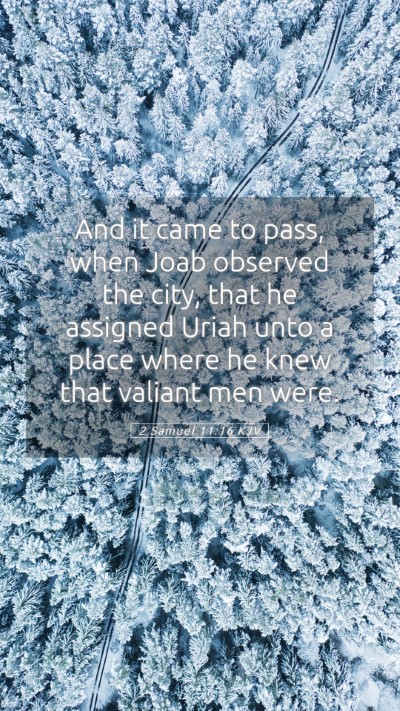2 Samuel 11:16 - Verse Commentary and Interpretation
Verse Reference: 2 Samuel 11:16
Text of the Verse: "And it came to pass, when Joab observed the city, that he assigned Uriah unto a place where he knew that valiant men were." (2 Samuel 11:16, KJV)
Understanding 2 Samuel 11:16
This verse is situated in a narrative filled with intrigue, moral failure, and the dire consequences of sin, particularly highlighting the actions taken by Joab at the behest of King David. The verse speaks to themes of strategy, war, and moral complexity in leadership.
Historical Context
In 2 Samuel chapter 11, we find the account of David's adultery with Bathsheba and the subsequent arrangement he makes to cover his sin. Uriah, Bathsheba's husband, becomes a central figure in this tragic chain of events. The context involves the ongoing conflict between Israel and the Ammonites, illustrating the harsh realities of warfare and leadership.
Bible Verse Meanings and Insights
- Joab's Role: Joab, David's military commander, demonstrates loyalty even when executing David's morally dubious orders. His assignment of Uriah to a dangerous position in battle reveals the tension between duty to God and loyalty to a flawed king.
- Uriah's Valor: The mention of placing Uriah among 'valiant men' serves to underscore Uriah’s courage and loyalty. He is portrayed as a noble character, making his eventual fate all the more tragic.
- Moral Complexity: The verse encapsulates the moral failings present within leadership. David's manipulative actions define the tragedy of sin, showcasing the ripple effects on those involved, especially the innocent.
- Consequences of Sin: This account serves as a grim reminder of the consequences that follow sin. David's desire to cover his transgression leads to greater sins, highlighting a common theme in Scripture of the downward path of moral compromise.
Commentary Overview
Drawing from Matthew Henry, Adam Clarke, and Albert Barnes, the commentary on this verse reveals rich insights into the psyche of both Joab and David, as well as Uriah's character. Matthew Henry draws attention to the fact that Joab's action reflects calculated obedience, while also alluding to the moral decay surrounding David's leadership. Adam Clarke emphasizes the tragic nature of Uriah’s fate, a reflection of David's betrayal, contrasting the king's might with his moral weakness. Albert Barnes expands on the consequence of such actions, noting how they lead to David's eventual downfall and public disgrace.
Application of the Verse
This verse urges readers to reflect on the nature of leadership and the importance of integrity. It challenges individuals in positions of authority to consider the ramifications of their decisions, especially when they conflict with moral righteousness. The decisions made by leaders can have profound effects on those who follow them, making accountability and wise counsel vital.
Related Bible Cross References
- 2 Samuel 11:15 - The plot against Uriah
- 2 Samuel 11:17 - Uriah’s death in battle
- 2 Samuel 12:9 - Nathan confronts David about his sin
- Psalm 51 - David’s repentance after his sin
- Matthew 5:27-28 - New Testament teachings on adultery and lust
- Proverbs 16:18 - A warning about pride preceding destruction
- Galatians 6:7 - A reminder that one reaps what they sow
Conclusion
In summary, 2 Samuel 11:16 is a critical verse that encapsulates the interplay of sin, leadership, and consequence. It calls for deep reflection on the nature of our decisions and the impact they have on the lives of others, serving as a cautionary tale for both personal reflection and broader societal structures. This verse also invites ongoing exploration for those engaging in Bible study and seeking Bible verse meanings, providing ample material for Bible study groups and discussions around how to interpret Bible verses effectively.


